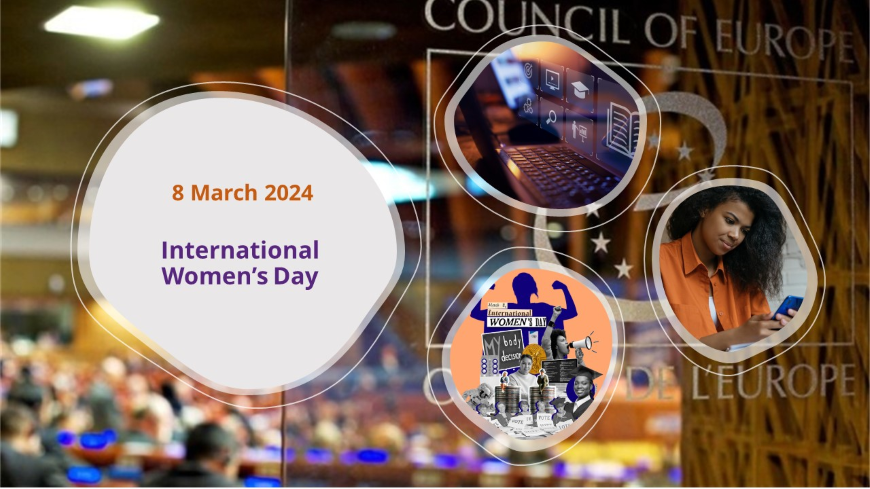Once again, International Women’s Day is an opportunity to look back at what has been achieved in the field of violence – and more specifically for us, cyberviolence – against women. While research continues to highlight gender inequalities in terms of exposure to cyberviolence, the multiplication of initiatives, awareness-raising events, reports, surveys or articles, show that progress in controlling cyberviolence against women is underway.
In March 2023, the sixty-seventh session of the Commission on the Status of Women, which took place in New York, was the first in the Commission’s history to have a specific focus on gender equality and digital technologies. Representatives of Member States, UN entities, and ECOSOC-accredited non-governmental organisations (NGOs) from all regions of the world were invited to contribute to the session and to the shaping of an open, safe, and equal digital future for all women and girls.
In April 2023, the role of men and boys in combatting online violence against women was addressed at a Council of Europe conference. This event provided an opportunity to discuss and promote the need for concrete strategies and focused on the role of men and boys in gender equality policies and policies to combat violence against women.
In June 2023, a Council of Europe project started on "Combatting digital and sexual violence against women in Bosnia and Herzegovina“, with the aim of supporting authorities in Bosnia and Herzegovina to further align their legislation, policies and practices to the standards of the Council of Europe Convention on preventing and combating violence against women and domestic violence (Istanbul Convention). From 3-5 October 2023, the project's team met with representatives of key institutions to identify synergies and best ways to foster technical support and to transfer know how on combatting sexual and digital violence against women. The project will run until December 2024.
1 October 2023 marked the entry into force of the Council of Europe Convention on Preventing and Combating Violence against Women and Domestic Violence (CETS 210) in respect of the European Union, which became the 38th Party to the Convention.
On 25 November 2023, International Day for the Elimination of Violence Against Women marked the launch of the UNiTE campaign (Nov 25- Dec 10) managed by UN Women, an initiative of 16 days of activism. This campaign Invest to Prevent Violence against Women & Girls called on citizens to show how much they care about ending violence against women and girls and call on governments worldwide to share how they are investing in gender-based violence prevention. On the occasion of this international day, Dominique Hasler, President of the Committee of Ministers and Marija Pejčinović Burić, Secretary General of the Council of Europe, called “on all Council of Europe member states which have not yet done so, and other interested states outside Europe, to join our treaty and our efforts to end violence against women.”
To conclude the year, in December 2023, the cyberviolence resource was presented during the Octopus Conference which took place in Bucharest, Romania. This conference, organised every 12 to 18 months by the Council of Europe, constitutes one of the biggest and finest platforms of exchange in cybercrime gathering experts from more than 100 countries, international organisations, private sector and academia. It was also a good platform for cyberviolence matters to be discussed, and the resource was presented through a dedicated booth set up throughout the event.
This year, in February 2024, an informal agreement was reached between the Council and European Parliament on the first-ever EU-wide law to address all forms of violence against women, including cyberviolence. “This is a big step forward to better protect women and girls from violence, whether at home, at work, on our streets, off-line or on-line. The directive has a strong chapter on prevention to act against underlying patterns of coercion, power and control (…).”, stated Marie-Colline Leroy, Belgian Secretary of State for Gender Equality. Amongst several other offenses, this new law would criminalise cybercrime-related ones, including non-consensual sharing of intimate images, cyber stalking, cyber harassment, and online incitement to hatred or violence. Reporting acts of online violence, and submitting evidence, would be facilitated by the setting up of user-friendly channels. Today, this informal agreement is pending approval by the representatives of EU member states at the Council.
Hopefully, 2024 will also see the activation of the EU-wide harmonised number for helplines for victims of violence against women (116 016, reachable with the same number across the EU) that the European Commission had announced in 2022. Member States had to commit to connecting their existing helplines for victims of violence against women to this number before end of April 2023.



